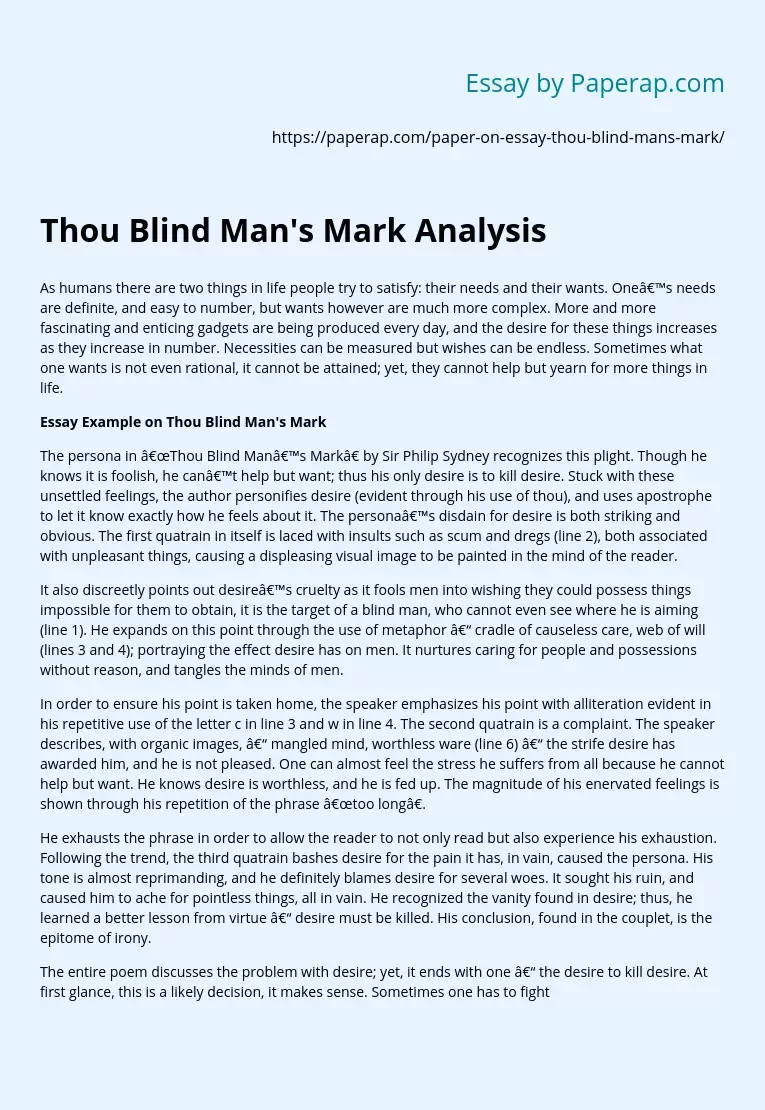Thou Blind Man's Mark Analysis
As humans there are two things in life people try to satisfy: their needs and their wants. One’s needs are definite, and easy to number, but wants however are much more complex. More and more fascinating and enticing gadgets are being produced every day, and the desire for these things increases as they increase in number. Necessities can be measured but wishes can be endless. Sometimes what one wants is not even rational, it cannot be attained; yet, they cannot help but yearn for more things in life.
Essay Example on Thou Blind Man’s Mark
The persona in “Thou Blind Man’s Mark” by Sir Philip Sydney recognizes this plight. Though he knows it is foolish, he can’t help but want; thus his only desire is to kill desire. Stuck with these unsettled feelings, the author personifies desire (evident through his use of thou), and uses apostrophe to let it know exactly how he feels about it. The persona’s disdain for desire is both striking and obvious.
The first quatrain in itself is laced with insults such as scum and dregs (line 2), both associated with unpleasant things, causing a displeasing visual image to be painted in the mind of the reader.
It also discreetly points out desire’s cruelty as it fools men into wishing they could possess things impossible for them to obtain, it is the target of a blind man, who cannot even see where he is aiming (line 1). He expands on this point through the use of metaphor – cradle of causeless care, web of will (lines 3 and 4); portraying the effect desire has on men.
It nurtures caring for people and possessions without reason, and tangles the minds of men.
In order to ensure his point is taken home, the speaker emphasizes his point with alliteration evident in his repetitive use of the letter c in line 3 and w in line 4. The second quatrain is a complaint. The speaker describes, with organic images, – mangled mind, worthless ware (line 6) – the strife desire has awarded him, and he is not pleased. One can almost feel the stress he suffers from all because he cannot help but want. He knows desire is worthless, and he is fed up. The magnitude of his enervated feelings is shown through his repetition of the phrase “too long”.
He exhausts the phrase in order to allow the reader to not only read but also experience his exhaustion. Following the trend, the third quatrain bashes desire for the pain it has, in vain, caused the persona. His tone is almost reprimanding, and he definitely blames desire for several woes. It sought his ruin, and caused him to ache for pointless things, all in vain. He recognized the vanity found in desire; thus, he learned a better lesson from virtue – desire must be killed. His conclusion, found in the couplet, is the epitome of irony.
The entire poem discusses the problem with desire; yet, it ends with one – the desire to kill desire. At first glance, this is a likely decision, it makes sense. Sometimes one has to fight fire with fire, or in this case desire with desire, but there is more to this sentence than a likely conclusion. Though it seems to be a paradox, it in fact reinforces an important theme found in the poem. The persona struggled with scorn for desire throughout the entire work; yet, in the end, he still needs it. This reveals one very powerful message – desire cannot be escaped.
Thou Blind Man's Mark Analysis. (2019, Nov 27). Retrieved from https://paperap.com/paper-on-essay-thou-blind-mans-mark/

